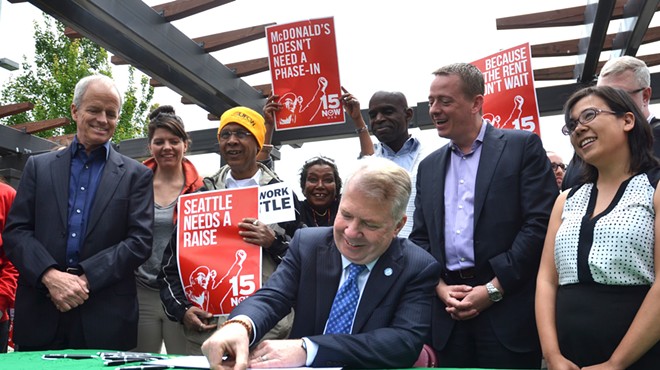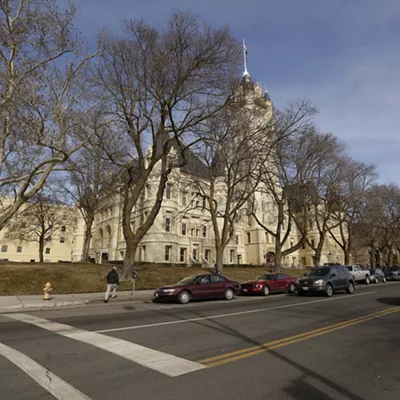Monday, August 24, 2015
If you MUST live on minimum wage, Spokane's a great place to do it
Last week we published a blog clarifying that, no, the Spokane City Council is not looking at bumping the current $9.47 minimum wage up to $15 an hour.
It's important to look at that in context. A website called Smartasset recently looked at the 141 largest cities in the United States, examined their minimum wage, and then adjusted it for cost of living. In other words, if you're being paid $9.47 an hour, how much does that $9.47 actually get you?
Smartasset dubbed it the "Real Minimum Wage." And of all those cities, the Real Minimum Wage in Spokane is the second highest in the country, just behind Kennewick.
Working a full 40 hours, every single week, that would be $19,697.60 per year. If you took two weeks of unpaid vacation, that's $18,940 a year.
One classic metric of how easy it is to survive on your salary is to look at how much of your income is being swallowed up by rent. Traditionally, 30 to 33 percent was the ideal target. (Today, there are critics of using such a figure.)
I live in a one-bedroom apartment in Browne's Addition. The bathroom and kitchen are a little small, but as far as location, it's absolutely perfect. Nearly everything I need is in easy biking distance. It only costs me $450 a month, electrical bill not included. That's $5,400 a year.
Assuming I was living on full-time minimum wage with two weeks vacation, I'd still only be spending about 28 percent of my salary on rent. Not too shabby. Even if I add in the $226.60 I spent in electrical utilities over the past year, that's still less than 30 percent of a minimum wage income. (Most minimum wage workers, of course, don't get 40 hours a week.)
Contrast that with Seattle. Former Inlander writer Heidi Groover now works at The Stranger. She lives in a studio apartment in the centrally located Capitol Hill neighborhood (like Browne's Addition, a lot of young people live in Capitol Hill.) Her rent, minus her electric bill, is $995. Like me, she feels she got a very good deal for her city. (The average rent price in the Capitol Hill neighborhood is $1,430.)
For the purposes of argument, assume she were a minimum-wage employee. At the state minimum wage, working a full time job, she'd be spending nearly two-thirds of her income on housing. Even with Seattle's current minimum wage of $11-an-hour for most businesses, she'd be spending half of her salary on rent. In fact, even with a $15-an-hour minimum wage, she'd still be spending more than a third of her income on rent.
After all, by at least one cost-of-living calculator, a minimum wage salary in Spokane is equivalent to a $13.22 per hour salary in Seattle.
It's one reason some pundits suggest that, while a $15 an hour minimum wage may make sense for dense high-cost cities, it doesn't always pencil out for the other parts of their state. (To understand why rent is so much higher in places like Seattle, and what could be done about that, check out Matt Yglesias's The Rent is Too Damn High.)
By contrast, it's fairly easy to get by on a comparatively small salary in Spokane.
My sister and brother-in-law are raising two kids on a single-earner second-year-teacher income (plus tiny stipends from my brother-in-law's middle-school coaching and running club.) They recently bought a house in Indian Trail, and they're still under that 30 percent housing-costs threshold. They have to budget carefully and scrimp costs. But they still have enough left over to pay for Netflix.
Not only that, but Washington state doesn't have a "tip credit." It means that if you're working as a minimum wage restaurant server, your employer still has to pay you $9.47 an hour. In Idaho, they can pay tipped employees as little as $3.35 an hour. Your minimum-wage base pay for eight hours of work in a Washington state restaurant is nearly $50 more than if you worked at an Idaho restaurant. (Lesson: Tip your Idaho servers well, ladies and gentlemen.)
There's a downside, of course, to living in a low cost-of-living place like Spokane. Spokane County's median household income is $49,233. King County's median household income is $71,811. As a city, that lower median income makes it harder for the community to attract investment or to get a top tier bond rating. And it means that if you want a higher salary, you may need to move to Seattle. Just don't expect your money to be worth as much there.
(As for the debate over the impact minimum wage has on businesses and poverty, I wrote about that last year.)
It's important to look at that in context. A website called Smartasset recently looked at the 141 largest cities in the United States, examined their minimum wage, and then adjusted it for cost of living. In other words, if you're being paid $9.47 an hour, how much does that $9.47 actually get you?
Smartasset dubbed it the "Real Minimum Wage." And of all those cities, the Real Minimum Wage in Spokane is the second highest in the country, just behind Kennewick.
Working a full 40 hours, every single week, that would be $19,697.60 per year. If you took two weeks of unpaid vacation, that's $18,940 a year.
One classic metric of how easy it is to survive on your salary is to look at how much of your income is being swallowed up by rent. Traditionally, 30 to 33 percent was the ideal target. (Today, there are critics of using such a figure.)
I live in a one-bedroom apartment in Browne's Addition. The bathroom and kitchen are a little small, but as far as location, it's absolutely perfect. Nearly everything I need is in easy biking distance. It only costs me $450 a month, electrical bill not included. That's $5,400 a year.
Assuming I was living on full-time minimum wage with two weeks vacation, I'd still only be spending about 28 percent of my salary on rent. Not too shabby. Even if I add in the $226.60 I spent in electrical utilities over the past year, that's still less than 30 percent of a minimum wage income. (Most minimum wage workers, of course, don't get 40 hours a week.)
Contrast that with Seattle. Former Inlander writer Heidi Groover now works at The Stranger. She lives in a studio apartment in the centrally located Capitol Hill neighborhood (like Browne's Addition, a lot of young people live in Capitol Hill.) Her rent, minus her electric bill, is $995. Like me, she feels she got a very good deal for her city. (The average rent price in the Capitol Hill neighborhood is $1,430.)
For the purposes of argument, assume she were a minimum-wage employee. At the state minimum wage, working a full time job, she'd be spending nearly two-thirds of her income on housing. Even with Seattle's current minimum wage of $11-an-hour for most businesses, she'd be spending half of her salary on rent. In fact, even with a $15-an-hour minimum wage, she'd still be spending more than a third of her income on rent.
After all, by at least one cost-of-living calculator, a minimum wage salary in Spokane is equivalent to a $13.22 per hour salary in Seattle.
It's one reason some pundits suggest that, while a $15 an hour minimum wage may make sense for dense high-cost cities, it doesn't always pencil out for the other parts of their state. (To understand why rent is so much higher in places like Seattle, and what could be done about that, check out Matt Yglesias's The Rent is Too Damn High.)
By contrast, it's fairly easy to get by on a comparatively small salary in Spokane.
My sister and brother-in-law are raising two kids on a single-earner second-year-teacher income (plus tiny stipends from my brother-in-law's middle-school coaching and running club.) They recently bought a house in Indian Trail, and they're still under that 30 percent housing-costs threshold. They have to budget carefully and scrimp costs. But they still have enough left over to pay for Netflix.
Not only that, but Washington state doesn't have a "tip credit." It means that if you're working as a minimum wage restaurant server, your employer still has to pay you $9.47 an hour. In Idaho, they can pay tipped employees as little as $3.35 an hour. Your minimum-wage base pay for eight hours of work in a Washington state restaurant is nearly $50 more than if you worked at an Idaho restaurant. (Lesson: Tip your Idaho servers well, ladies and gentlemen.)
There's a downside, of course, to living in a low cost-of-living place like Spokane. Spokane County's median household income is $49,233. King County's median household income is $71,811. As a city, that lower median income makes it harder for the community to attract investment or to get a top tier bond rating. And it means that if you want a higher salary, you may need to move to Seattle. Just don't expect your money to be worth as much there.
(As for the debate over the impact minimum wage has on businesses and poverty, I wrote about that last year.)
Tags: Seattle; Minimum wage , News , Image





























